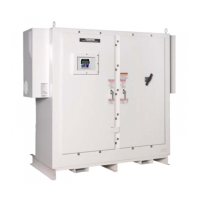30 HX7+ ASD Installation and Operation Manual
operation. This input terminal may be programmed to any of the functions listed in Table 14 on
page 189 (see F118).
RR — The default function assigned to this terminal is Frequency Mode 1. The RR terminal accepts a
0 – 10 VDC input signal that is used to control the function assigned to this terminal. This input terminal
may be programmed to control the speed, torque, or Acc/Dec of the motor via an amplitude setting or
regulate the ASD output by setting a limit. The gain and bias of this terminal may be adjusted for
application-specific suitability (see
F210– F215).
RX — The default function assigned to this terminal is Torque Command. The RX terminal accepts a
±10 VDC input signal that is used to control the function assigned to this terminal. This input terminal
may be programmed to control the speed or torque of the motor via an amplitude setting or regulate the
ASD output by setting a limit. The gain and bias of this terminal may be adjusted for application-
specific suitability (see
F216 – F221).
Note: The VI terminal or the II terminal may be used to control the speed or torque of the
motor, but both cannot be used simultaneously. In cases where either terminal may be
used for a function, they will be listed in the manual as VI/II.
VI — The VI terminal is an isolated voltage input that may be used to control the output speed or output
torque of the ASD. Select VI/II at
F004 for speed control or select VI/II at F420 for torque control. The
VI terminal receives a 0 – 10 VDC input signal that controls the output 0.0 – Maximum Frequency
speed output or the -250% – 250% torque output. Terminal scaling is accomplished via
F201 – F206.
The gain and bias of this terminal may be adjusted for application-specific suitability (see F470 and
F471).
II — The II terminal is an isolated current input that may be used to control the output speed or output
torque of the ASD. Select VI/II at
F004 for speed control or select VI/II at F420 for torque control. The
II terminal receives a 0 – 20 mA input signal that controls the output 0.0 – Maximum Frequency speed
output or the -250% – 250% torque output. Terminal scaling is accomplished via
F201 – F206. The gain
and bias of this terminal may be adjusted for application-specific suitability (see F470 and F471).
P24 — +24 VDC at 200 mA power supply for customer use.
PP — The function of output PP is to provide a 10 VDC/10 mADC (max.) output that may be divided
using a potentiometer. The tapped voltage is applied to the RR input to provide manual control of the
RR programmed function.
OUT1 — The default setting for this output terminal is the Output Low Speed. This output terminal
may be programmed to provide an indication that any of the events listed in
Table 16 on page 194 has
occurred or are active. This function may be used to signal the operator or to activate external
equipment or a brake (see
F130). The OUT1 contact is rated at 2 A/120 VAC and 2 A/30 VDC.
OUT2 — The default setting for this output terminal is the Fault. This output terminal may be
programmed to provide an indication that any of the events list in
Table 16 on page 194 has occurred or
are active. This function may be used to signal the operator or to activate external equipment or a brake
(see
F131). The OUT1 contact is rated at 2 A/120 VAC and 2 A/30 VDC.
FP — The default function of this output terminal is to output a series of pulses at a rate that is a
function of the ASD output frequency (50 mA max. at 1.0 kHz to 43.3 kHz). As the output frequency of
the ASD changes so does the FP output pulse rate. This terminal may be programmed to provide an
output pulse rate that is proportional to the magnitude of the user-selected item from
Table 15 on
page 193. For further information on this terminal, see parameter F676.
AM — This output terminal produces an output current that is proportional to the output frequency of
the ASD or of the magnitude of the function assigned to this terminal. The available assignments for
this output terminal are listed in
Table 15 on page 193. For further information on this terminal, see
F670.

